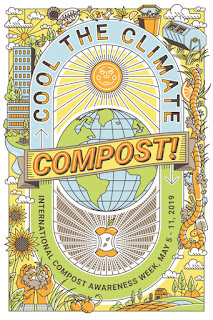 Did you know that this week is International Compost Awareness Week (ICAW)? I didn’t either until a few days ago, even though it’s apparently been around since 1995. The goal is “to raise the awareness of the public regarding the benefits of using compost to improve or maintain high quality soil, to grow healthy plants, reduce the use of fertilizer and pesticides, improve water quality and protect the environment”. With such lofty aspirations, what can an individual do to participate, especially someone who does not garden or lives in an apartment (or some other dwelling without a yard)? Plenty, as it turns out.
Did you know that this week is International Compost Awareness Week (ICAW)? I didn’t either until a few days ago, even though it’s apparently been around since 1995. The goal is “to raise the awareness of the public regarding the benefits of using compost to improve or maintain high quality soil, to grow healthy plants, reduce the use of fertilizer and pesticides, improve water quality and protect the environment”. With such lofty aspirations, what can an individual do to participate, especially someone who does not garden or lives in an apartment (or some other dwelling without a yard)? Plenty, as it turns out. |
| 2019 ICAW Poster Contest Winner |
Even if you are serious about your commitment to a better Earth, you may still have some concerns about the composting process, especially in small-space homes. Most of these are probably very common and can be overcome. For instance:
• The hassle of it all – Granted, there will be a change in the way things are done, but they do not necessarily mean more work and can actually reduce waste-related work. For instance, you will be making fewer trips to the dumpster and your trash will be lighter. Bear in mind that, when making a lifestyle change, the greatest effort is often in changing an attitude.
• It will take up too much room – All you really need is a bit of counter or floor space to place a bin in. There are many fine options out there that are designed with indoor composting in mind and we carry several of them. If you are a DIY kind of person, you could re-purpose a plastic bin or make your own from scraps of wood.
• It’ll smell up the place – Don’t accept the myth that all compost is disgusting and smelly. The odor should be closer to dirt than decomposition. If you are adding the proper items in the proper way, any odor problem you may have comes from the way the compost is being maintained. Your compost can start stinking if it is not mixed enough, or has too much moisture, or not enough green material. All of which can be fixed easily. For more details, look here.
So, release your misgivings and start having fun with this simple yet effective way to help our planet.
 |
| No, not these kind of earthworms. |
So what is a poor, non-gardening apartment dweller to do with all the compost that will be produced? After all, you can only fill so many potted plants. There are some interesting options out there, including:
Farmers Markets – Ask the vendors if they would like donations to their compost piles, either in the form of compost itself or thoughtfully collected scraps. Even if they are a “no”, they may have other ideas for you. Markets close to you can easily be found online.
Schools – Many schools have gardens and most are happy to accept donations of nearly any form. Here at ARBICO, we donate compost and other gardening supplies to the kids at La Paloma Academy.
 Community Gardens – Neighborhood gardens are common in many, if not most, places these days. You are already a part of a community, with your new-found composting spirit, you can become part of the community gardeners. You can find one near you here.
Community Gardens – Neighborhood gardens are common in many, if not most, places these days. You are already a part of a community, with your new-found composting spirit, you can become part of the community gardeners. You can find one near you here. Chicken Lovers – Raising backyard chickens is all the rage and the community is strong. While they may not need compost, your scraps could be greatly appreciated. Reach out on the BackYard Chickens site or go back to the Farmers Market and look for someone selling eggs.
Go Online – Offer compost and/or scraps on Craigslist or some similar site. Of course, always take the necessary precautions when opening yourself up to strangers. A more gentle approach would be to post on your Facebook.
City/Local Services - Check out local colleges and universities to see if they have sustainability programs you can tap into. Go to your municipality’s website to see what they have going. If you contact your local county extension office, someone there will probably have some good suggestions for you.
 Give Back - Why not give back directly to Mother Earth? The next time you are hiking or walking your dog or just out in nature, sprinkle some compost around a tree or in a field. As long as you make sure you are not on private property and that the compost is clean, it should be a win-win type of thing. For extra fun, make it a family affair and put your heads together to find new and interesting spots to visit for each compost drop.
Give Back - Why not give back directly to Mother Earth? The next time you are hiking or walking your dog or just out in nature, sprinkle some compost around a tree or in a field. As long as you make sure you are not on private property and that the compost is clean, it should be a win-win type of thing. For extra fun, make it a family affair and put your heads together to find new and interesting spots to visit for each compost drop.Submitted by Pam







No comments:
Post a Comment